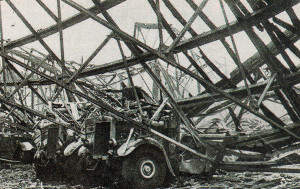
It was 9.20 pm on August 27th, 1940, when my
mother entered the room saying: “Grandfather has
called to say he didn’t like the sound of the aircraft overhead and has advised us to go to our Anderson shelter.” Mother went – but my father, a Sergeant ARP Rescue and me, a 16-year-old ARP Messenger Boy, stayed put. Suddenly, father shouted: “Down!” and threw my twin brother and I to the floor of our home in Regent Street in Gillingham in Kent. Bombs were screaming their way to earth followed by earth-quaking explosions.
Uniforms, helmets and respirators were quickly put on as we hurried up the garden to witness three houses laying demolished in the next street.
Reaching the rear of the houses, I entered the garden and ran to the trellis work gate. On releasing the latch, the gate fell on top of me, taking me with it to the ground.
But once in the yard, I faced the lady of the house, frying pan in hand with sausages still sizzling who screamed: “My husband’s in there!”
Entering the dust-filled kitchen, then into the remains of the living room, where the
ceiling was nearly at floor level, I shouted: “Anyone there!”
Suddenly I saw a face amongst the bricks and timber. “Can you get up?” I asked. “No,” came the reply. ‘You are standing on my legs. Removing the chair-back from off the man’s neck, I led him out.
With a mile to go to reach the warden’s post, I suddenly smelt gas and found a large hole from which it was escaping. I had just finished warning the householders when a policeman cycled up. “Burst gas main,” I informed him. “Don’t worry about that, son,” he replied. “There’s at least a 500-pounder down there.” I left quickly.
Of the four people I had seen since leaving home, one was an old lady out looking for her cat and asking if there was a raid on. She had not heard the siren.
Around the corner, flames rose ten feet from another burst main and front doors were burning and blistering. A row of shops were blazing and glass carpeted the road.
Suddenly, at 11.30pm, the air raid warning sounded and I had already spent two hours trying to get to my post. On the distance flames reached high into the smoke-filled sky and bus tyres bursting added to the noise of cracking timbers.
Once I made it to the warden’s post, I was once again driven to the ground by another fall of stick bombs. Some hit the nearby bakery sending baking tins flying like shrapnel through the windows of the
facing shop windows.
A group of wardens and I were requested to clear the debris blocking the road through to the Royal Chatham Naval Hospital. While doing this, another huge bomb demolished the nearby Co-op stores and the area was put into darkness.
It was reported that Gillingham that day had over 250 incidents – but I arrived home at 5.30am dirty, tired – but happy to be 16 and alive.
Hugh Cooper








